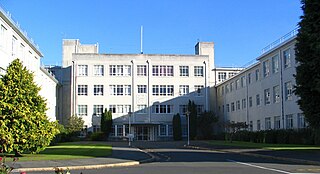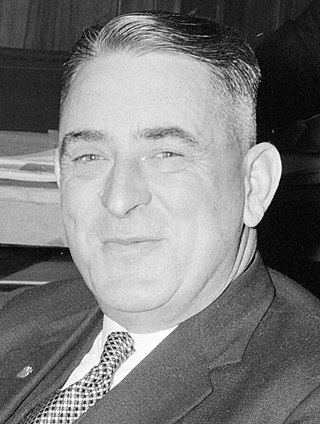
The University of Otago is a public research collegiate university based in Dunedin, Otago, New Zealand. Founded in 1869, Otago is New Zealand’s oldest University and one of the oldest universities in Oceania.

Dunedin is the second-largest city in the South Island of New Zealand, and the principal city of the Otago region. Its name comes from Dùn Èideann, the Scottish Gaelic name for Edinburgh, the capital of Scotland. The city has a rich Scottish, Chinese and Māori heritage.

Horace Robert Martineau VC was a British recipient of the Victoria Cross, the highest award for gallantry in the face of the enemy that can be awarded to British and Commonwealth forces.
Trinity Catholic College is a Catholic, state-integrated, co-educational, secondary school located in central Dunedin, New Zealand. The school was founded in 1989 as the successor of several other secondary schools the oldest of which was founded in 1871. Trinity is the only Catholic secondary school in Dunedin and is open to enrolments from throughout the entire city. The school's proprietor is the Bishop of Dunedin.

Wakari Hospital is a psychiatric hospital located in Dunedin, New Zealand.

Philip George Connolly was a New Zealand politician of the Labour Party.
Wakari is a residential suburb of the New Zealand city of Dunedin. It is located 2.5 kilometres (1.6 mi) to the northwest of the city centre, immediately to the west of the ridge which runs to the west of the city's centre. Wakari lies to the north of the upper reaches of the Kaikorai Valley, and is also north of the suburb of Kaikorai. The suburbs of Roslyn and Maori Hill are situated on the ridge immediately to the southeast and east of Wakari. The suburb of Halfway Bush lies to the northwest, and the smaller suburb of Helensburgh lies to the north.
John Charles Jamieson Stoke (1928–2000) was Director of Public Health in New Zealand from 1986 to 1987.

Charles Mackie Begg was a New Zealand medical doctor and surgeon who served in the First World War as a medical administrator with the New Zealand Expeditionary Force.
The Anzac of the Year Award is awarded each year by the Royal New Zealand Returned and Services' Association (RSA) to New Zealanders who demonstrate the spirit of the Anzac soldiers; people who serve others in a "positive, selfless and compassionate manner" and who demonstrate the qualities of comradeship, compassion, courage and commitment.
Sir Neil Colquhoun Begg was a New Zealand paediatrician, historian and cricketer. He played three first-class matches for the Otago cricket team after the beginning of World War II, but he is most noted as a paediatrician and an historian. He served as director of medical services for the Plunket Society from 1956 to 1977, and, with his brother Charles, wrote four books on the history of Fiordland. He chaired the New Zealand Historic Places Trust between 1978 and 1986.
The 1950 New Year Honours in New Zealand were appointments by King George VI on the advice of the New Zealand government to various orders and honours to reward and highlight good works by New Zealanders. The awards celebrated the passing of 1949 and the beginning of 1950, and were announced on 2 January 1950.
The 1956 New Year Honours in New Zealand were appointments by Elizabeth II on the advice of the New Zealand government to various orders and honours to reward and highlight good works by New Zealanders. The awards celebrated the passing of 1955 and the beginning of 1956, and were announced on 2 January 1956.
Jennifer McMahon is a New Zealand nurse and nutritionist. From 2012 until November 2018, she was the president of the New Zealand Red Cross Society. In 2018 she was made a Companion of the Royal Society Te Apārangi in recognition of her contributions to health research and to aiding disadvantaged populations worldwide.

John Renata Broughton is a New Zealand academic. He is Māori, of Ngāi Tahu and Ngāti Kahungunu descent, and since 2012 has been a full professor at the University of Otago.

The Southern District Health Board was a district health board which provided healthcare to an area covering the southern half of the South Island of New Zealand. In July 2022, the Southern DHB was dissolved as part of a nationwide overhaul of the district health board system. Its former functions and responsibilities were taken over by Te Whatu Ora.
The 1983 Queen's Birthday Honours in New Zealand, celebrating the official birthday of Elizabeth II, were appointments made by the Queen in her right as Queen of New Zealand, on the advice of the New Zealand government, to various orders and honours to reward and highlight good works by New Zealanders. They were announced on 11 June 1983.
The 1984 New Year Honours in New Zealand were appointments by Elizabeth II on the advice of the New Zealand government to various orders and honours to reward and highlight good works by New Zealanders. The awards celebrated the passing of 1983 and the beginning of 1984, and were announced on 31 December 1983.
Keith John Sheen was a New Zealand educationalist. He was educated in Gisborne and trained as a teacher in Christchurch. After graduating with first class honours in Latin, he completed a PhD in French at University College London. Returning to New Zealand, he taught languages for fourteen years at Otago Boys' High School, where he was renowned for his ability to keep discipline. In 1950 Sheen became liaison officer at Auckland University College, before moving to the Department of Education, where he held several positions. He was appointed to the Commission on Education in 1960, and in 1966 was appointed Director-General of Education. After his retirement in 1971 he was a visiting fellow in the education department of the University of Otago, and published a translation of the elegies of Propertius.
Glenys Patricia Arthur was a New Zealand neurologist. She campaigned for the rights of women medical practitioners, and was the first woman to serve on the executive of the New Zealand Medical Association, between 1983 and 1989. She was a co-founder of the Wellington branch of the New Zealand Medical Women's Association, and twice served as the association's national president. In 1989, she was elected to the Wellington Area Health Board.









